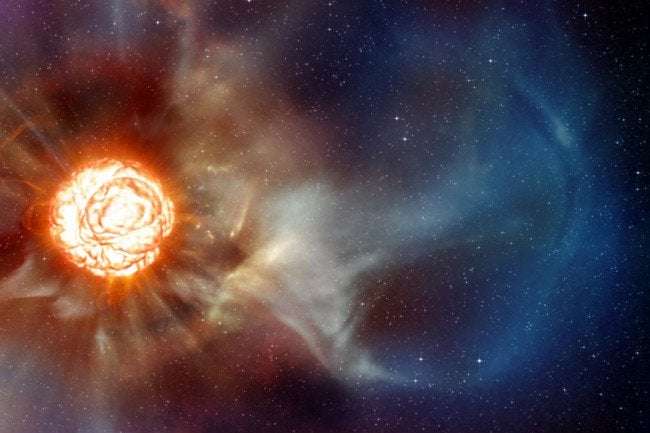For about 25 years, Richard Wasatonic, an astronomer at Villanova University in Pennsylvania, has measured the brightness of Betelgeuse with a 10-inch diameter telescope in his backyard. He's worked with another Villanova astronomer named Edward Guinan, as well as an amateur astronomer named Thomas Calderwood. In October, they noticed that Betelgeuse was getting fainter again. By early December, they realized that Betelgeuse had gotten fainter than it had in the past 25 years and put out a post on a site known as The Astronomer’s Telegram to alert other astronomers.
“It kept getting fainter,” Guinan said. “Every night, it was fainter than the previous night, and I said, ‘Well, it has to stop soon.’ And it hasn’t.”
On Dec. 23, they posted an update. Betelgeuse had gotten fainter still, and it was now the faintest it has been in the last century or so — for as long as astronomers have been able to measure its brightness with detectors rather than judging by eye. At its brightest, Betelgeuse is usually one of the six or seven brightest stars visible to humans in the night sky. By mid-December, it had dropped several places on that list, to 21st brightest.
The unusual dimming episode has made some astronomers wonder whether Betelgeuse is about to go supernova. Life on Earth would be fine if Betelgeuse did explode.
Based on its mass, astronomers estimate that the supergiant will go supernova when it’s roughly 9 million years old. According to Guinan, Betelgeuse is probably between 8 and 9 million years old now. Astronomers have recently estimated that Betelgeuse might be due for a supernova in about 100,000 years or so. When it blows, it'll be spectacular. The explosion will be about half as bright as the full Moon, Guinan said. Anyone lucky enough to be around would be able to see it shine during the day for months until it fades away.
Astronomers have carefully observed the behaviors of many stars after they exploded as supernovae. But no one has had a detailed look at how a star behaves leading up to a supernova. So astronomers don’t really know whether the current dimming event is leading up to a supernova. What they do know is that it’d be pretty unlikely for the explosion to go off now when there’s so much uncertainty in their understanding of Betelgeuse’s behavior and even its age.
Guinan and his team will keep monitoring Betelgeuse, as they have been for decades. Based on Betelgeuse's past dimming and brightening patterns — the star seems to cycle in brightness both every 6 years or so and every 425 days — they expect that it'll get its faintest in January and then get brighter again. But they'll have to see if that's the case.
"It defies prediction," Guinan said. "It's hard to predict what it’s going to do in the future."

Autumnleaves201 on December 28th, 2019 at 02:15 UTC »
I mean, if it goes supernova it will definitely brighten up.
Embarrassed_Praline on December 28th, 2019 at 02:12 UTC »
What I got from the article is that astronomers are really excited by what they're seeing but are predicting that it won't be really exciting.
wwarnout on December 27th, 2019 at 23:38 UTC »
"anytime soon" refers to human lifetimes. If it happened in 100 years, that would be quick in a cosmic time scale.